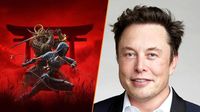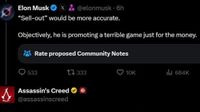In a surprising turn of events, Elon Musk, the billionaire behind Tesla and SpaceX, has found himself embroiled in a public spat with Ubisoft over the company’s latest release, Assassin's Creed Shadows. Musk's harsh criticism of the game has sparked a viral exchange on social media, showcasing the power of digital interactions in the gaming industry.
On March 26, 2025, Musk took to X (formerly Twitter) to voice his disdain for Assassin's Creed Shadows, labeling it a "terrible game." His comments were sparked by a post from Mark Kern, a former game director at Blizzard Entertainment and a vocal critic of diversity, equity, and inclusion (DEI) initiatives in gaming. Kern had criticized Ubisoft for its promotional partnerships with streamers, specifically targeting HasanAbi, who had been promoting the game. Musk echoed Kern's sentiments, calling Hasan a "fraud" and accusing him of promoting the game merely for financial gain.
Ubisoft's official account wasted no time in responding to Musk's remarks. In a witty comeback, they referenced Musk's previous controversies regarding his gaming habits, specifically his admission of using account-boosting services in games like Path of Exile 2. The Assassin's Creed team quipped, "Is that what the guy playing your Path of Exile 2 account told you?" This jab quickly gained traction, amassing nearly 400,000 likes, while Musk's original posts garnered 16,000 and 44,000 likes, respectively.
Despite Musk's critical stance, the reality is that Assassin's Creed Shadows has been performing exceptionally well since its launch on March 20, 2025. The game achieved the second-most successful launch in the franchise's history, with over two million players within the first two days. Analysts predict that it could reach around six million players in its first month, trailing only behind Assassin's Creed Valhalla.
This exchange highlights the complex dynamics of influencer marketing in the gaming world. Kern's original critique of Ubisoft's advertising strategy resonated with Musk, who has a significant following on social media. However, the backlash from Ubisoft has not only defended their product but may have inadvertently boosted sales as players expressed interest in purchasing the game following the exchange.
Interestingly, Musk's gaming history adds another layer to this controversy. He has previously admitted to hiring others to level up his characters in Path of Exile 2 and Diablo IV, raising questions about his credibility when critiquing others in the gaming space. This history makes Ubisoft's response particularly poignant, as it challenges Musk's authority to judge a game he may not fully engage with in a traditional sense.
As the conversation unfolded, it became evident that Musk's comments may have backfired. Many users on X noted that they had purchased Assassin's Creed Shadows after seeing Ubisoft's clever retort, demonstrating the unpredictable nature of social media interactions. The incident serves as a reminder of how quickly narratives can shift in the digital age, especially when high-profile figures are involved.
Ubisoft's successful launch and the subsequent online dialogue reflect a broader trend within the gaming industry, where social media can significantly influence consumer behavior. The robust engagement surrounding this incident underscores the potential for brands to leverage public figures and their platforms, whether positively or negatively.
Moreover, the exchange has sparked discussions about the ethics of influencer marketing and the responsibilities that come with it. Critics argue that paying influencers to promote games can compromise the authenticity of their endorsements, a concern that Kern raised when discussing Ubisoft's partnership with HasanAbi. Musk's alignment with Kern's critique further complicates the narrative, as it blends personal opinion with broader industry concerns.
As the dust settles on this digital showdown, it remains to be seen how it will affect both Musk and Ubisoft in the long run. For now, Assassin's Creed Shadows continues to thrive, buoyed by a strong launch and the unexpected publicity from a high-profile spat. This incident illustrates the unpredictable nature of social media and its capacity to shape public perception in real-time.
In conclusion, the ongoing dialogue surrounding Assassin's Creed Shadows and Elon Musk's involvement highlights the complexities of the gaming industry and the influence of social media. As both players and critics engage in this digital landscape, the outcomes of such interactions will undoubtedly continue to evolve, shaping the future of gaming and its marketing strategies.







